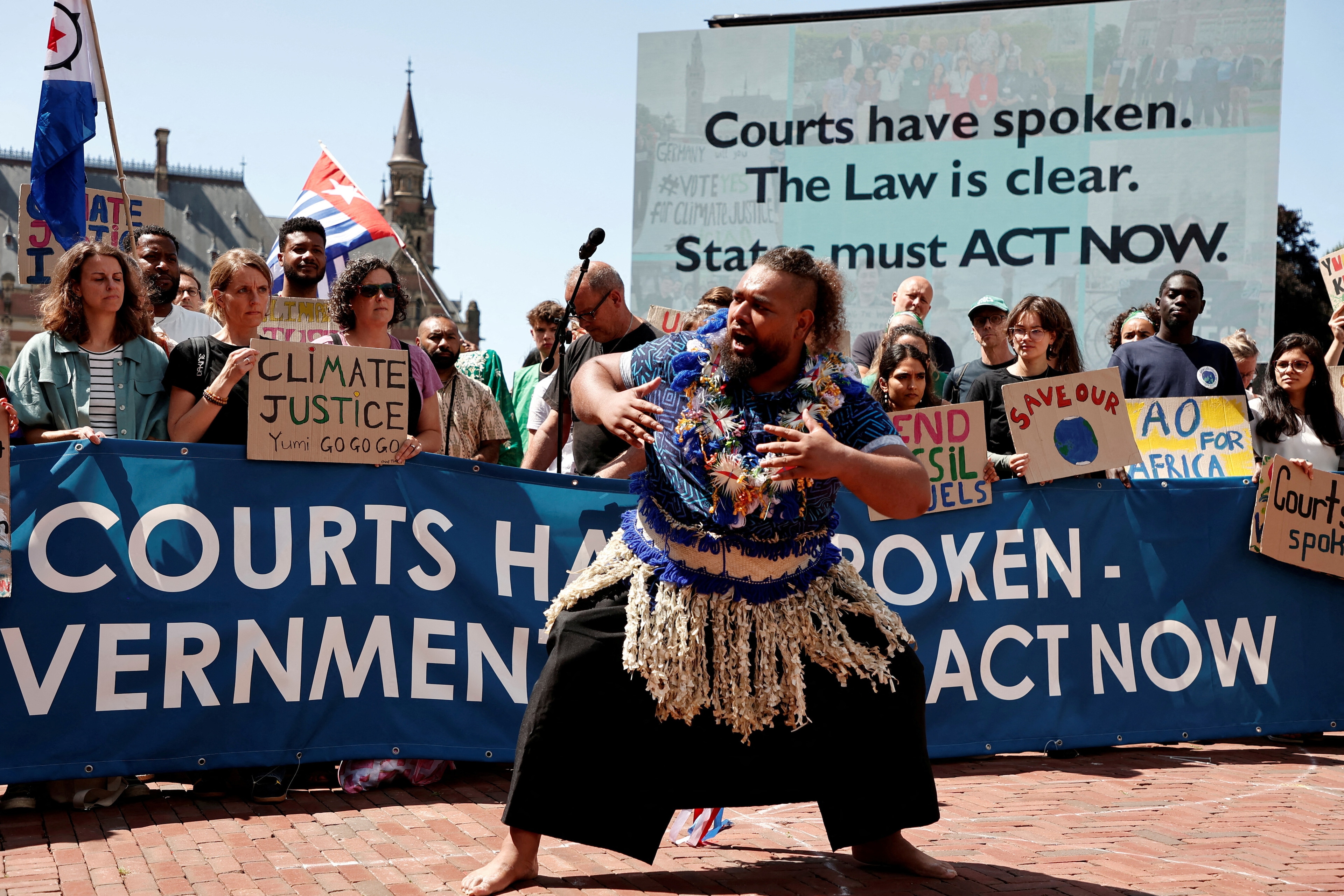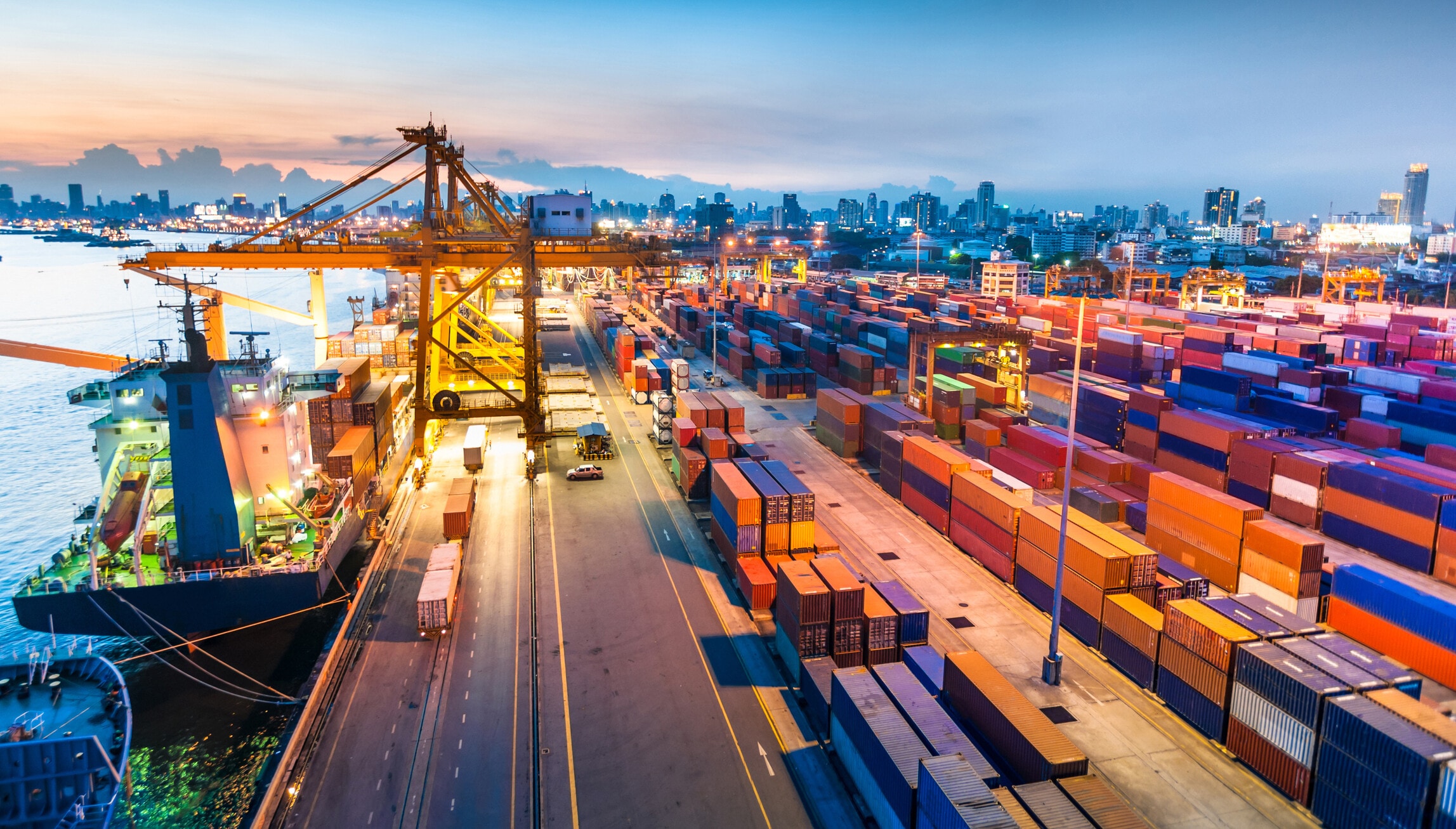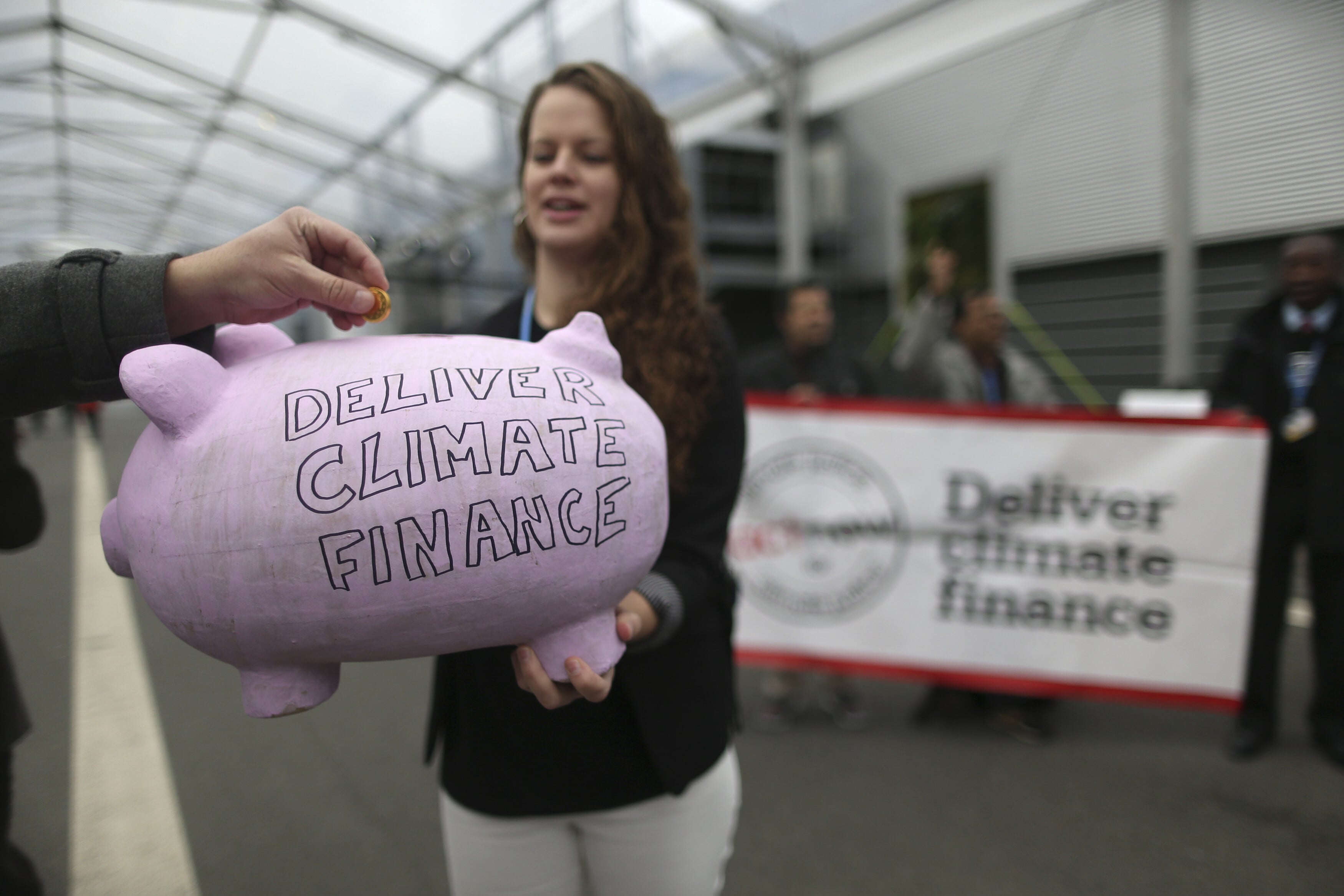Cow burps, competition, and the perils of being first with laws to protect the planet

Cattle are a significant source of emissions, and Denmark's poised to become the first country to tax them.
Image: REUTERS/Nick Oxford
- Denmark is planning a first-of-its-kind tax on agricultural emissions to help it reach its climate goals.
- But an organization representing farmers calls it a ‘terrifying experiment.’
- Pushback has been standard for groundbreaking legislative efforts to protect the natural environment throughout history, not all of which succeed.
- Other recent examples include The Hague’s ban on fossil-fuel advertising.
By the middle of the last century, it was clear to many people that improving the noxious air quality in London would require ridding households of their traditional coal fires. George Orwell was not one of those people.
The famously crusty author penned a homage to the coal fire as an essential gathering place and immovable cornerstone of domestic life. Yes, it was making “the fogs of our cities" thicker, he wrote, but “the survival of the family as an institution may be more dependent on it than we realize.” This was just one of those lines societies shouldn’t cross.
Slightly more than a decade later, it was crossed. The UK’s Clean Air Act passed in 1956 included “smokeless areas” and grants for coal alternatives. It’s one of many first-of-their-kind laws aimed at protecting the natural environment, often with mixed results but uniformly pointing in the right direction.
The UK legislation was enacted not long after the start of what’s now called the Great Acceleration of human enterprise and energy use, which has wrought extensive damage. Desperate efforts to decelerate now include doing the once unthinkable with legal machinery.
Like taxing cow burps.
That’s the primary way bovines expel methane, a particularly potent greenhouse gas, though there are others. The Danish Government announced an agreement in June to tax livestock emissions starting at an annual rate of about €16 per tonne, or nearly €100 per cow. It would be a novel experiment.
A spokesperson for the Danish Parliament said the tax, and other aspects of the government’s “Green Denmark” plan, still have to win approval there. But it’s already being hailed by environmentalists as “historic.” A Danish organization representing farmers had another word for it: “terrifying.”

The organization, Sustainable Agriculture, argues that while there is clearly a climate problem to be solved, the government’s initiative is burdensome bureaucracy that could distort competition – and, by the way, Danish farms are already relatively efficient and environmentally friendly.
As the Danish government was finalizing its plan, the government in New Zealand preemptively canceled a similar scheme. “It doesn’t make sense to send jobs and production overseas, while less carbon-efficient countries produce the food the world needs,” it said.
Sustainable Agriculture was quick to declare Denmark now “completely alone.”
In some ways, New Zealand seemed like a more likely candidate for the policy. Agriculture accounts for nearly half of its greenhouse gas emissions, and it has far more cattle than people.
In fact, the total number of dairy and non-dairy cattle in New Zealand increased by about 16% in the past half-century. In Denmark, the number declined by almost half over the same period. The respective amounts of methane produced in each country by the enteric fermentation within these animals, a form of digestion expressed in emissions-heavy burps, have followed similarly divergent paths.
Still, it’s a pressing problem that demands concerted action. According to the UN, enteric fermentation generates about four times the emissions globally as the next-biggest source in food production: rice cultivation.
Addressing it has to start somewhere. Why not Denmark?
There’s nearly one head of cattle there for every four people, which isn’t exactly negligible. In addition to wildly popular weight loss drugs, the country exports a lot of meat; users of the World Economic Forum’s Transformation Maps know it accounted for more than 7% of global meat exports as recently as 2000, though that slipped below 3% by 2022.
‘Paving the way’ for others to follow
And yet, even in a place where centrist politics predominate, and officials were lauded for working together with agricultural groups on details of the emissions tax, not quite everyone in Denmark is on board. It’s hard to be groundbreaking.
The Danish Prime Minister said she hopes the effort will “pave the way” for similar measures elsewhere.
The EU is studying a trading system that may have polluting farmers pay a price for agricultural emissions. That could provide supportive cover for Denmark’s initiative; the people relied on for the food we’ll need tomorrow are sensitive to also being saddled with climate measures meant to pay dividends decades from now.
Not long ago, the EU dialed back its plans for cutting agricultural emissions amid protests. Tractors had rumbled through central Prague to rally against environmental restrictions deemed onerous and unfair. In Germany, climate-focused plans to to cut subsidies for the diesel fuel used in agricultural machinery stirred weeks of unrest. A Slovenian lawmaker dubbed 2024 the “year of angry farmers.”
First-of-their-kind decrees meant to shield the health of people and the planet always encounter at least some resistance. Collective gains have to be tallied against losses that aren’t necessarily evenly distributed.
“You cannot make people pay money and treat them like infants,” a tobacco industry advocate complained when, in 1990, the US banned smoking on most domestic flights. Companies and their customers felt unjustly singled out. Now, it’s hard to imagine ever having to spend time in a smoky fuselage.
When Bangladesh implemented a landmark ban on single-use plastic bags in 2002, one critic called it a “sabotaging” of the economy. More than 100 countries now have similar laws.
France formulated a repairability index in 2021 that made companies selling electronics there score their products accordingly, to reduce waste. Not everyone was thrilled, though a subsequent analysis identified positive effects on both products and consumer behavior. The Hague recently became the first city to ban advertising promoting fossil fuels in public spaces. One backer said it “sends an important signal.”

It’s not just the gassy air; what’s usually referred to as manure management is also problematic. The fact that livestock is such a prominent source of emissions makes it an enticing target for innovation. If we can’t get sufficiently creative with regulation and taxes to address it, maybe entrepreneurs can find a way by fiddling with cow science.
“Sexed semen” is now widely available to streamline the breeding of herds in ways that cut emissions. Some startups are taking on cow burps directly – an early investor in Twitter (pre-“X”) has backed the maker of a cattle feed supplement, derived from elements of garlic and citrus, that causes digestion to be more climate-friendly.
That particular startup was founded in Switzerland, where farmers recently aired their own grievances with the government – but this time because it hasn’t done enough to combat climate change. Innovation could be a way to help farmers everywhere deal with the problem directly, without feeling they’re being deprived of a competitive edge in the process.
The UK’s Clean Air Act, the first fully-fledged national law of its kind, also drew criticism that it would unfairly impair an industry before it was passed in 1956.
By that point, George Orwell, who once described an attempt to count belching industrial chimneys in Sheffield that was foiled by the smoke-filled air, wasn’t around anymore. He’d died of tuberculosis in 1950.
Orwell also wasn’t alive to witness the real impetus behind the Clean Air Act: the Great Smog of 1952. For five days in December of that year, a high-pressure weather system sealed London in a toxic cloud of pollution that killed thousands of people.
The problem had become inescapable. The legal engineering designed to solve it was never going to appeal to everyone.
An accumulation of similarly jarring climate events might highlight the potential usefulness of more of the same sort of legislative pioneering.
Accept our marketing cookies to access this content.
These cookies are currently disabled in your browser.
More reading on cow burps and the climate crisis
For more context, here are links to further reading from the World Economic Forum's Strategic Intelligence platform:
- More research is needed to identify the best traits for “low-emission cows,” according to this study, which suggests that less-gassy versions could be bred to protect the climate. (Science Daily)
- “How Denmark keeps the far right at bay.” Unlike in other countries it did not dominate recent European elections, and according to this piece there are some clear reasons why. (Project Syndicate)
- What’s at stake: Denmark is also home to an official collection of historical photos of glaciers in the country’s autonomous territory Greenland that were recently used, according to this piece, to measure an alarming acceleration of ice melt. (Yale Climate Connections)
- “Ground-breaking but a mixed bag.” This piece argues that farmers deserve more comprehensive reforms that help them shrink carbon footprints, but Denmark’s planned tax on agricultural emissions is at least a step in the right direction. (Social Europe)
- This explainer lists the countries where agriculture is the top source of emissions; New Zealand is there, Denmark is not. (World Resources Institute)
- What if we can just make the cows burp less? One of the startups described in this piece was built on a finding that feeding cattle a certain type of algae reduces their methane burps by 80%. (Wired)
- Things could be much, much worse: 250 million years ago it was the putrid belching of microbes that hastened the biggest mass extinction in the planet’s history, according to this study. (Science Daily)
On the Strategic Intelligence platform, you can find feeds of expert analysis related to Agriculture, the Law, the Climate Crisis, and hundreds of additional topics. You’ll need to register to view.
Don't miss any update on this topic
Create a free account and access your personalized content collection with our latest publications and analyses.
License and Republishing
World Economic Forum articles may be republished in accordance with the Creative Commons Attribution-NonCommercial-NoDerivatives 4.0 International Public License, and in accordance with our Terms of Use.
The views expressed in this article are those of the author alone and not the World Economic Forum.
Forum Stories newsletter
Bringing you weekly curated insights and analysis on the global issues that matter.
More on Climate ActionSee all
Tom Crowfoot
July 30, 2025
Tom Crowfoot
July 30, 2025
Wee Kean Fong and Yvonne Zhou
July 29, 2025
Pranidhi Sawhney and Adam Skali
July 29, 2025
David Carlin and Sourajit Aiyer
July 28, 2025





